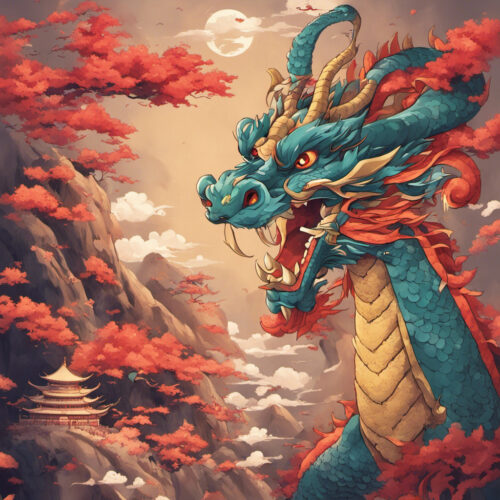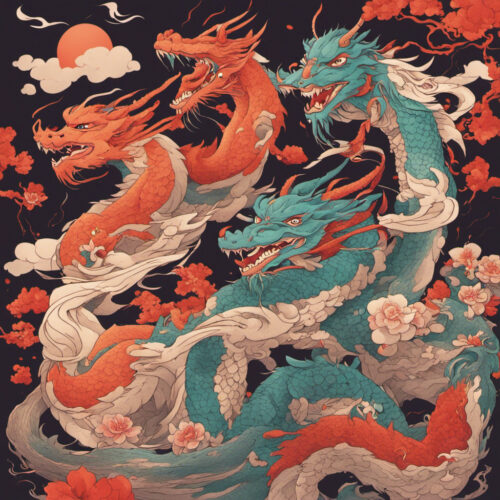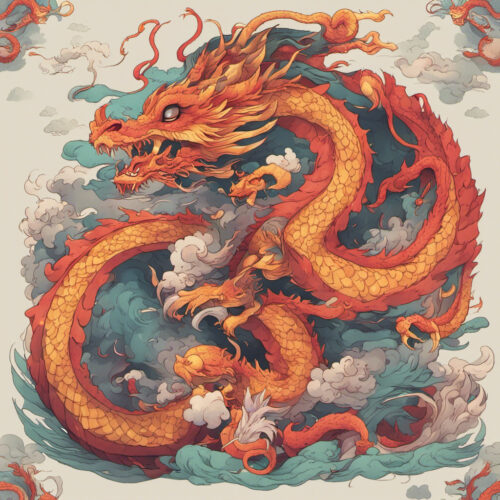The dragon holds a significant place in Chinese folklore and religion, shaping the cultural identity of this ancient civilization. Its powerful presence can be traced through countless tales, myths, and artistic representations. In this article, we will explore the profound influence of dragons in Chinese culture.
The Symbolism of Dragons
Dragons are revered as sacred creatures in Chinese mythology, symbolizing power, wisdom, and good fortune. They are often depicted as majestic creatures with scales, horns, and the ability to breathe fire. Dragons are believed to bring rain, controlling the weather and ensuring bountiful harvests.
The Connection to Chinese Emperors
In Chinese history, emperors were often associated with dragons. The dragon symbolized the emperor’s power and authority, with the imperial throne referred to as the “Dragon Throne.” Emperors believed they possessed dragon-like qualities, representing the divine link between heaven and earth.

Dragons in Chinese Folklore
Chinese folklore is replete with captivating stories of dragons. The story of the Dragon Gate tells of carps swimming upstream and transforming into dragons after leaping over a powerful waterfall. This tale signifies transformation, perseverance, and the potential for growth.
One of the most popular dragon stories is the Legend of the Dragon Boat Festival. It commemorates the life of the poet Qu Yuan, who drowned himself in a river as a form of protest. The legend says that people raced boats and threw rice cakes wrapped in leaves into the river to prevent the fish from devouring Qu Yuan’s body. This gave rise to the Dragon Boat Festival celebrated annually.
The Dragon Dance and Chinese New Year
Dragon dances are a vibrant and captivating part of Chinese New Year celebrations. The dragon, often made of silk, bamboo, and other materials, is maneuvered skillfully by a team of dancers. The dance is believed to drive away evil spirits and bring good luck and prosperity for the coming year.
Dragons in Chinese Religion
Dragons have deep-rooted connections in Chinese religion, particularly in Taoism and Buddhism. In Taoism, dragons are seen as the bearers of profound spiritual wisdom. They are associated with the element of water, balancing yin and yang energies and promoting harmony.
Buddhism also incorporates dragon symbolism within its beliefs. The Dragon King, a revered deity, guards the dharma and possesses the power to control the rain. Dragons in Buddhist art often represent enlightenment, strength, and protection.
Dragon Links to Chinese Astrology
Dragons play a central role in Chinese astrology’s zodiac system. The Year of the Dragon is highly regarded as one of the most auspicious years, associated with ambition, power, and success. Those born in the Year of the Dragon are believed to inherit these qualities.
Contemporary Influence and Popularity
The influence of dragons extends beyond folklore and religion in modern Chinese society. Dragons are frequently depicted in various forms of art, including paintings, sculptures, and even tattoos. They have become a symbol of national identity, representing the resilience, wisdom, and vitality of the Chinese people.
Moreover, the fascination with dragons is not limited to China. Dragon imagery has captivated people worldwide, influencing popular culture, literature, movies, and even gaming. Countless books, movies, and television series featuring dragons have garnered widespread acclaim, emphasizing their enduring allure.
Conclusion
The influence of dragons in Chinese folklore and religion permeates every aspect of the culture. From ancient stories and religious beliefs to modern-day celebrations and artistic expressions, dragons have held and continue to hold a significant place in Chinese society.
Further Reading
- Dragons in Chinese Zodiac
- The Legendary Chinese Dragons
- Dragon History, Mythology, and Meaning in Chinese Culture


